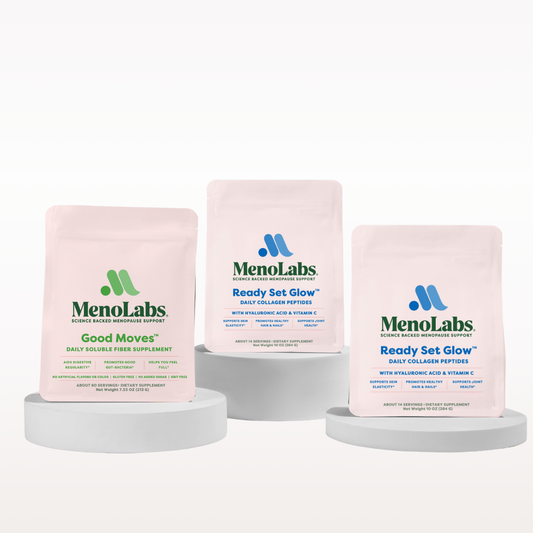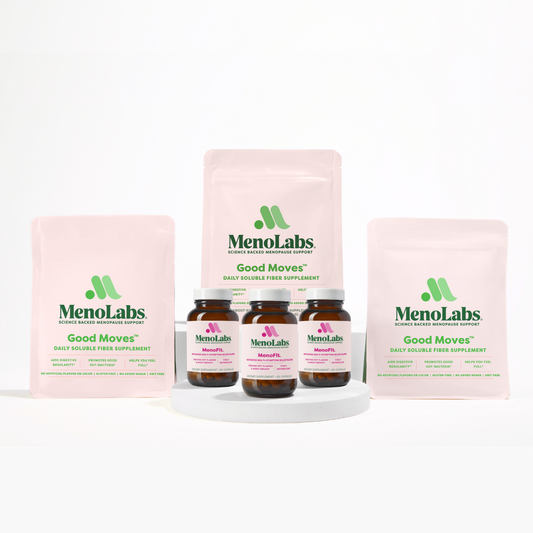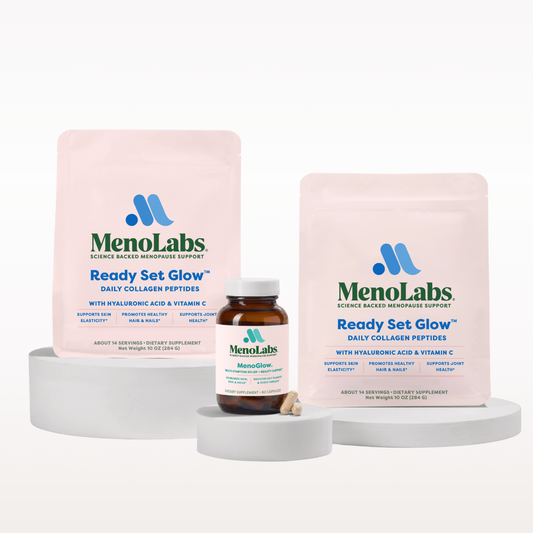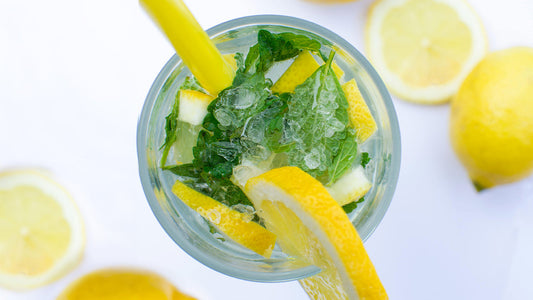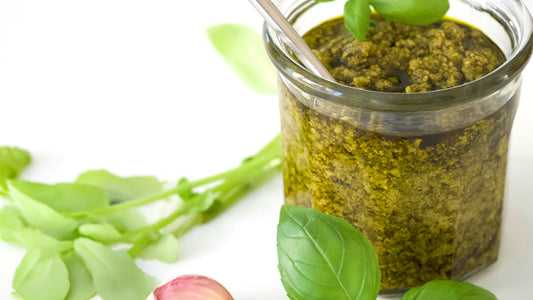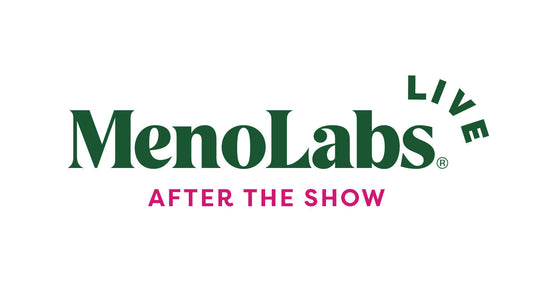Summer is just around the corner, and as temperatures rise, so do those hot flashes. Hot flashes are the most common symptom women in perimenopause and menopause experience, as the changes to estrogen levels make it more difficult for the body to regulate its core temperature.
Hot flashes during summer can be especially challenging to deal with. But there are ways to cope, even during the sweatiest months of the year.
Avoid Hot Flash Triggers
There are many hot flash triggers that we come into contact with everyday. However, the big three are spice foods, caffeine, and alcohol. These are the most common hot flash triggers among women of perimenopausal and menopausal ages, but why? How do these three things increase the likelihood of hot flashes or night sweats?
Spicy Foods
Spicy foods that contain things like peppers, spicy herbs, salsas, and even kimchi can have an impact on the rate at which blood flows through the body. Spicy foods are vasodilators, meaning they cause blood vessels to widen. When blood vessels are wide, blood circulates through the bloodstream more quickly. This raises heart rate and increases blood pressure.
When these two things occur, an area of the brain called the hypothalamus registers these events as a sign that the body is overheating. So the hypothalamus sends signals to the sweat glands to release sweat onto the skin to cool the body down. This is a hot flash.
So instead of eating those spicy tacos or ordering a hot curry, go for meals that are lighter on the spices and higher in fiber. Roasted vegetables with fish or chicken and quinoa can do a lot for the body and reduce the risk of triggering a hot flash. Be sure to check out our recipes for some great fiber-rich meals.
Caffeine
While that cup of coffee in the morning may have the perfect pick-me-up for a busy workday, high quantities of caffeine can make hot flashes even worse for perimenopausal and menopausal women. Caffeine is a stimulant, and like many stimulants, it causes blood vessels to constrict or become narrow. This process is called vasoconstriction.
Vasoconstriction causes blood to circulate through the body at a lower rate and increases blood pressure. When this occurs, heart rate increases in an effort to pump blood more quickly. The brain registers both of these events as a sign that the body is overheating, or close to overheating, and sends signals to the glands to release sweat.
Although not all women experience hot flashes immediately after consuming caffeine products like coffee and tea, the amount of caffeine consumed on a daily basis can increase the risk of hot flashes presenting themselves, especially in women of older ages in the perimenopause stage who are about to enter menopause.
Alcohol
Like spicy foods, alcohol is a vasodilator. It causes blood vessels to widen and for blood flow to increase. Consuming high quantities of alcohol can cause body temperature to rise rapidly before rapidly lowering. Sweating after consuming high volumes of alcohol is common in even non-menopausal women and men. However, in menopausal women alcohol consumption can trigger a hot flash even faster. Some women find they experience a hot flash after one glass of wine and some women don’t.
It’s recommended that if you are going to drink alcohol as a menopausal woman, that you drink low amounts of alcohol with a low alcohol percentage. Having a half glass of wine with dinner or a light beer should be fine. Try to stay away from hard liquor as the high alcohol percentage can cause symptoms to present much faster.
Wear Breathable Clothes
We may not think of our clothes as hot flash triggers, but in reality, they can be just as troublesome as caffeine, alcohol, or spicy foods. Wearing tight-fitting clothes, or clothes made of fabrics that are not very breathable can trigger hot flashes just as easily. How?
Tight clothing sits close to the skin, even when coming into contact with external surfaces. This generates friction against the skin. The friction from these clothes against the skin creates heat which then gets trapped underneath the fabric, especially if it’s a heavier, non-breathable fabric like knits, wools, certain polyester blends and leather. The heat generated near the skin causes the skin to warm up which raises body temperature.
Remember what happens after that? That’s right, a hot flash! The hypothalamus registers this increase in body temperature as the body overheating. So it tells the sweat glands to release that sweet sweat and cool the skin down.
So to avoid triggering a hot flash from friction from your clothes, opt for different, lighter clothing options. Wear clothes that are loose fitting and made from breathable fabrics like cotton, linens, even some light silk blends can help reduce the likelihood of experiencing hot flashes or night sweats.
Stock up on Fans
Environmental factors have as much of an impact on triggering hot flashes as our food and beverage choices. When the outside temperature rises, so too does body temperature. When the air surrounding the skin is warm it transfers that heat to the skin, raising superficial body temperature.
Although the body is fairly consistent at regulating core body temperature, heat that gets transferred to the skin can slightly raise core body temperature. This is especially common as women undergo the menopausal transition. Profuse sweating helps keep the surface of the skin cool and lowers body temperature from the outside-in. However, keeping the air surrounding the skin relatively cool can also help the body maintain comfortable body temperature.
Stocking up on a few electric fans can help keep you cool. Use a smaller desk fan at work or at your home office. Invest in larger fans for bigger rooms and be sure to position them in places where the stream of air flows best. Using a fan at night pointed at the bed can also be beneficial in helping reduce the risk of night sweats. If you have trouble sleeping with noise in the background, invest in an electric fan that is made to produce less noise.
Stay Hydrated
More often than not, dehydration is one of the biggest contributing factors of hot flashes and night sweats. Studies have shown that close to 75 percent of the U.S. population suffers from chronic dehydration. Dehydration is one of the most common causes of headaches and fainting that sends people to the emergency room each year. It’s estimated that up to 60 percent of the adult human body is made of water, making it one of the most abundant fluids in the human body. So what happens when the body is dehydrated?
Our bodies rely on water to perform its many functions. Without adequate water levels, the amount of blood circulating through our body (blood volume) decreases. When blood volume decreases, the heart begins to beat faster to compensate for the lowered levels of blood circulation. At the same time, blood begins to retain more sodium, which makes it harder for it to circulate throughout the body even with an increased heart rate. When heart rate and blood pressure increase, the brain registers these two events as a sign of overheating which can trigger a hot flash.
Dehydration can also cause a serious strain on the heart, leading to heart palpitations. The lack of enough blood flow to the brain means that the brain cannot get enough oxygen delivered from red blood cells, which increases the risk of fainting. It’s recommended that women drink up to 96 ounces of water (around 12 cups) a day, however depending on where you live and the severity of weather conditions, that number may need to increase slightly.
Don’t Let Hot Flashes Dictate Your Life
Hot flashes can be uncomfortable but they shouldn’t negatively affect your overall quality of life. There are ways to help support menopausal symptoms like hot flashes and night sweats. If you still experience severe hot flashes or night sweats even after implementing these changes in your daily routine, please speak to a healthcare provider about what additional options are available to you. Don’t be afraid to ask your doctor questions about your symptoms or about menopause overall. They are here to help you.
Related Products
Blend Besties Bundle
Fresh Start Bundle
4.7 / 5.0
(554) 554 total reviews







